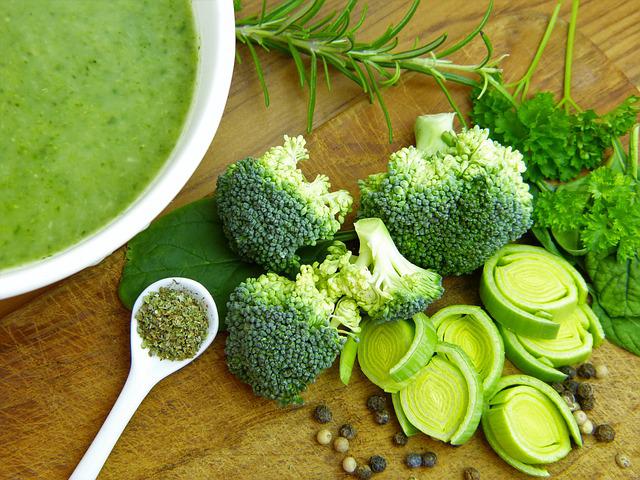The Top 5 Health Benefits of Eating Broccoli
Are you curious to know the top 5 health benefits of eating broccoli? Read on to find out everything you need to know about this delicious and healthy vegetable!
What Are The Benefits of Eating Bell Peppers?
If you’re looking to improve your health, there’s no better vegetable to start with than broccoli. This nutrient-dense food is packed with vitamins, minerals, and antioxidants, and has been shown to improve heart health, reduce the risk of cancer, and support cognitive function.
In addition to these benefits, broccoli is also low in calories and easy to digest, so it’s a great way to add nutrients and fiber to your diet without adding too many calories or carbs. Here are five health benefits of eating broccoli.
Health Benefits of Broccoli
Broccoli is a cruciferous vegetable that is a member of the Brassica oleracea family. Cruciferous vegetables are considered to be very healthy because they are high in antioxidants, vitamins, minerals, and fiber. Some of the most impressive health benefits of broccoli include the following:
- Broccoli fights cancer.
- Broccoli helps regulate blood sugar levels.
- Broccoli lowers the risk of heart disease and other cardiovascular diseases.
- Broccoli can help improve your cognitive function.
- Broccoli can boost your immune system.
- Broccoli fights cancer: – Oftentimes, we tend to forget that one of the healthiest foods we can eat is broccoli. Known for its potent anticancer properties, broccoli is a great dietary addition for those looking to boost their overall health and wellbeing. In fact, research shows that cruciferous vegetables, including broccoli, are consistently linked with a decreased risk of cancer.
Several studies have also shown that broccoli can slow down the growth of tumours, protect the cells that line the inside of your lungs and stomach, and reduce the risk of developing many other types of cancer. So if you’re looking to take your health to the next level, make sure to include broccoli on your plate!
- Broccoli helps regulate blood sugar levels:- Broccoli is a nutritious vegetable that is high in fiber, vitamins, and minerals. One of the key health benefits of eating broccoli is that it helps regulate blood sugar levels. Fiber in broccoli binds with carbohydrates in the stomach to make them settle and then pass through the intestinal tract more slowly.
This decreased absorption of glucose leads to a lower blood sugar response, which can help manage diabetes symptoms such as increased appetite, thirst, and urination. Additionally, broccoli is a good source of vitamin C, which plays an important role in maintaining healthy immune systems.
- Broccoli lowers the risk of heart disease and other cardiovascular diseases: – Broccoli is a cruciferous vegetable that is high in antioxidants and fiber. These nutrients have been shown to have a beneficial effect on the heart health by helping to lower the risk of heart disease and other cardiovascular diseases. One study showed that people who ate broccoli had a 32% lower risk of heart disease, compared to those who didn’t.
Additionally, broccoli is also rich in vitamins C, K, and E, all of which are essential for maintaining a healthy heart.
- Broccoli can help improve your cognitive function:- Brain health is essential, and you can achieve it by eating broccoli. According to a study published in the journal Nutrients, broccoli can help improve cognitive function by increasing the levels of antioxidants and polyphenols in the blood. These antioxidants help to protect your brain cells from damage, and polyphenols may help improve memory and cognitive function.
Additionally, broccoli is a good source of vitamins C and K, both of which play an important role in cognitive function. Finally, adding broccoli to your diet can help reduce the risk of coronary heart disease and stroke. So, try incorporating this cruciferous vegetable into your diet to improve your overall health!
- Broccoli can boost your immune system: – Yes, we know that broccoli is not always the most appetizing vegetable, but it’s worth eating for all the health benefits it provides. According to a study published in the journal Nutrients, broccoli can boost your immune system and help fight off infections.
It can also help reduce the risk of cancer and heart disease, and improve your cognitive health. In short, broccoli is a powerhouse vitamin- and mineral-rich vegetable that is essential for a healthy body and mind.
More Health Benefits of Broccoli
The biggest advantage of broccoli is its nutrients. It is loaded with a wide array of vitamins, minerals, fiber and other bioactive compounds.
One Cup (91g) Raw Broccoli Pack (1):
- Carbs: 6 grams
- Protein: 2.6 gram
- Fat: 0.3 grams
- Fiber: 2.4 grams
- Vitamin C: 135% of the RDI
- Vitamin A: 11% of the RDI
- Vitamin K: 116% of the RDI
- Vitamin B9 (Folate): 14% of the RDI
- Potassium: 8% of the RDI
- Phosphorus: 6% of the RDI
- Selenium: 3% of the RDI
Broccoli can be cooked or eaten raw – both are perfectly healthy but provide different nutritional profiles. Various cooking methods, such as boiling, microwave, stirring and steaming, alter the nutritional composition of vegetables, especially vitamin C, as well as reduce soluble protein and sugar. Steaming seems to have the least negative effect.

Still, raw or cooked, broccoli is an excellent source of vitamin C. Just half a cup (78 g) of cooked broccoli provides 84% reference to daily intake (RDI) – more than half can give oranges (3, 4))
Benefits of Asparagus
Broccoli is a rich source of multiple vitamins, minerals and fiber. Different cooking methods can affect the nutritional composition of vegetables, but broccoli, whether cooked or raw, is a healthy addition to your diet.
Broccoli benefits for skin
Broccoli is a cruciferous vegetable that is full of nutrients and benefits for your skin. Here are five of the best reasons to add broccoli to your diet:
- Broccoli is a good source of vitamin C, which is essential for healthy skin.
- Broccoli contains sulforaphane, a compound that has antioxidant properties and can help fight skin cancer cells.
- Broccoli is high in vitamin K, which is essential for strong bones and healthy blood regulation.
- Broccoli contains glucoraphanin, a compound that hasanti-inflammatory properties and can help reduce the appearance of wrinkles and age spots.
- Broccoli is a good source of fiber, which helps to regulate digestion and keep your gut healthy.
Broccoli benefits for hair
Broccoli is a great source of Vitamin C, which is essential for hair health. Vitamin C helps to prevent hair loss, strengthens hair, and prevents greying. It also helps to neutralize free radicals, reducing the risk of hair damage. Moreover, broccoli is a good source of anti-inflammatory nutrients, which can help to reduce the symptoms of scalp problems such as dandruff and oily scalp.
Health Benefits of Brazil Nuts
Broccoli contains Vitamin A, Vitamin C and Calcium which help in hair growth. Vitamins A and C stimulate the production of sebum, an oil-based extract that acts as a natural moisturizer and conditioner for the scalp and hair where calcium strengthens hair follicles.
Broccoli benefits for eyes
Eating broccoli has multiple health benefits for the eyes. The vegetable is high in antioxidants and flavonoids, which help protect the eyes from damage caused by free radicals. Broccoli also contains vitamin C, which helps neutralize harmful compounds and shield the eyes from UV radiation. Additionally, broccoli is a good source of vitamin K, which is essential for healthy blood clotting.
Broccoli is high in lutein and xanthine, two of the most important nutrients for your eyes because they help prevent retinal oxidation and age-related degeneration.
Broccoli benefits for diabetes
There are plenty of health benefits to eating broccoli, and one of the most important is that it can help improve your diabetes symptoms. Studies have shown that consuming broccoli can help lower blood sugar levels and improve insulin sensitivity.
It also contains a number of antioxidants, including sulforaphane, which has been shown to protect the cells in your pancreas from damage. In addition, broccoli is a rich source of fiber, which helps to regulate digestion and promote regular bowel movements.
Broccoli can also help manage your blood sugar levels. One study found that eating broccoli sprouts lowered blood glucose in patients with diabetes. The chemical sulforaphane in cruciferous vegetables, such as broccoli and sprouts, can cause low blood glucose levels.
Broccoli benefits for male
In order to ascertain the health benefits of broccoli for men, a study was conducted wherein three groups of men were given broccoli, a placebo, or no treatment at all. The study participants were asked to report any changes in their physical performance, mental focus, and sexual function over the course of two weeks. As it turns out, broccoli consumption was associated with an improvement in all three measures.
In particular, men who consumed broccoli reported better physical performance and better mental focus. Moreover, eating broccoli may also improve sexual function in men.
Benefits of broccoli sexually
If you’re looking for a healthy way to boost your libido, try adding broccoli to your regular diet. Not only is broccoli high in antioxidants, vitamin C, and fiber, but it also contains flavonoids and glucoraphanins which have been shown to improve sexual function in both men and women. In addition, broccoli is a good source of folic acid, which helps prevent birth defects in pregnant women. So add some steamed broccoli to your next meal plan and see how you feel!
This cruciferous vegetable is high in indole-3-carbinyl, which helps break down and regulate estrogen,” Steel smith notes. “Having the right levels of hormones stimulates a strong libido.” Excessive estrogen can make men and women feel cramped and tired.
Broccoli benefits for brain
Broccoli is a great source of vitamins, minerals, and antioxidants, which are essential for brain health. One cup of broccoli provides over 50% of the recommended daily intake of vitamin K, 25% of the recommended daily intake of vitamin C, and over 20% of the recommended daily intake of vitamin A. These nutrients help to promote healthy brain function and protect the cells from damage.
How to eat walnuts and get the most benefits
Additionally, broccoli is a good source of fiber, which helps to keep the gastrointestinal system healthy and functioning properly. Furthermore, broccoli is a good source of glucoraphanin, which is a potent antioxidant that helps to fight off cancerous cells.
As well as being a low-calorie source of dietary fiber, broccoli can be good for the brain. Broccoli contains a lot of compounds called glucosinolates. When the body breaks them down, they make isothiocyanate. Isothiocyanate may reduce oxidative stress and reduce the risk of neurodegenerative disease
What are the disadvantages of eating broccoli?
In most cases, raw broccoli is safe to enjoy with little or no risk. However, like most vegetables in the Cruciferous family, both raw and cooked broccoli can cause excessive gas or bloating in some people. Broccoli can cause digestive problems, especially in people with irritable bowel syndrome.
Why should broccoli be avoided?
Broccoli also contains thiocyanate. This compound is extremely dangerous because it leads to hyperthyroidism and because of that, you experience problems like weight gain, fatigue, hair loss and a swollen face, ”said dietitian and clinical nutritionist Anshika Srivastava.
Bottom Line
Broccoli also contains thiocyanate. This compound is extremely dangerous because it leads to hyperthyroidism and because of that, you experience problems like weight gain, fatigue, hair loss and a swollen face, ”said dietitian and clinical nutritionist Anshika Srivastava.













No comments:
Post a Comment